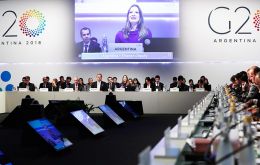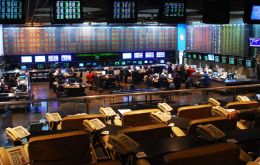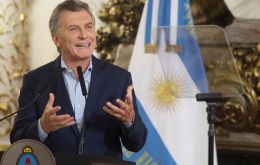MercoPress. South Atlantic News Agency
Tag: Argentina
-
Tuesday, July 24th 2018 - 04:28 UTC
IMF underlined financial pressures risks for vulnerable emerging economies

The IMF urged that trade conflicts be resolved via international cooperation, without resorting to exceptional measures, and underlined the world economy is facing increasing risks especially financial pressures in vulnerable emerging economies and the return of sovereign risks in parts of the Euro area.
-
Monday, July 23rd 2018 - 07:29 UTC
G20 ministers warn trade tensions risk derailing global growth and call for greater dialogue

Finance ministers and central bankers from the world’s largest economies said on Sunday that heightened trade and geopolitical tensions risk derailing global growth and called for greater dialogue, according to the final communique of a G20 meeting.
-
Monday, July 23rd 2018 - 05:58 UTC
Hammond in Argentina iterates Falklands self determination and calls on Macri to address inflation and labor reform

The UK Government position is unchanged: only the Falkland Islanders have the right to determine their own political and economic future, stated Phillip Hammond in Buenos Aires where he attended a two-day G20 ministers meeting.
-
Saturday, July 21st 2018 - 07:43 UTC
Capital flight from emerging economies will be on the G20 table, anticipate Brazilian sources

At this weekend's G20 meeting in Buenos Aires, finance ministers and central bankers will address the economic situations threatening a number of emerging markets -- including host nation Argentina, which recently secured a US$50 billion IMF loan to try to stabilize its economy, after the peso plunged 35% between April and June.
-
Friday, July 20th 2018 - 10:32 UTC
EU/Mercosur trade deal has a new timetable: September in Montevideo

A free trade agreement between the European Union and Mercosur is close to being concluded, with a final push over the line seen by early September, Argentina’s foreign minister said on Thursday. Negotiations between the EU and the Mercosur group of Argentina, Brazil, Paraguay and Uruguay, the world’s fourth largest trading bloc, have been going on for almost 20 years.
-
Friday, July 20th 2018 - 07:35 UTC
Argentina betting on a 2018/19 record wheat crop to spur the economy

A record wheat harvest expected in Argentina this year could arrive just in time to jumpstart the ailing country's economy in the fourth quarter, after growth has been hit by low investment, high inflation and a soy crop devastated by drought.
-
Friday, July 20th 2018 - 07:21 UTC
Argentina finances improving: half year primary deficit drops to 0.8% of GDP

Argentina posted a primary fiscal deficit of 105.8 billion pesos (US$3.7 billion), or 0.8% of gross domestic product (GDP) in the first half of 2018, government data showed on Thursday, down 26.7% from the same period last year.
-
Thursday, July 19th 2018 - 07:50 UTC
Brazilian Real and Argentine Peso lose ground against the dollar

Latin American currencies fell against the dollar across the board on Wednesday as traders continued to focus on recent statements by key U.S. monetary policy makers.
-
Thursday, July 19th 2018 - 07:44 UTC
Macri offers optimistic forecast of Argentine economy, pledging growth will return next year

Argentina’s economy will return to growth in 2019, President Mauricio Macri said on Wednesday, following a year marked by higher-than-expected inflation and a run on the Peso currency that many economists anticipate will lead to a recession.
-
Wednesday, July 18th 2018 - 07:38 UTC
Argentina consumer prices rose 3.7% in June and reach 29.5% in twelve months

Consumer prices rose 3.7% in June in Argentina, official data showed on Tuesday. That brought 12-month inflation to 29.5%, up from 26.3% in the 12 months through May, the INDEC national statistics bureau announced, which makes it the highest monthly recorded figure of the last two years.
